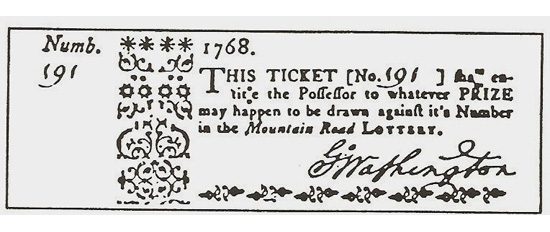Merrill Perlman of CJR’s “Language Corner” shares the above image of a 1768 lottery ticket signed by its purchaser, George Washington. It’s a venerable example of the its/it’s problem that vexes many of us.
Perlman writes:
Few usage experts would argue that “it’s” instead of “its” is perfectly OK, especially since the difference is so clear, at least to those who notice it. But what usage experts want and what people do are not the same thing.
But we’re not all doing this on purpose. I suspect that the misuse of “it’s” is far more common than the misuse of “its,” not because of any confusion over the distinction, but because it’s so habitual, when typing, to add that apostrophe.
And it’s even easier to do when writing longhand, with the momentum coming off the i and the t — dot, slash, stroke. It’s just too easy to add that apostrophe whether it’s in its proper place or not.
* * * * * * * * *
• Krissy Scalzi is correct. Her husband John is mistaken.
• Ed Cyzewski’s post about reading James Baldwin’s Go Tell It on the Mountain reminded me of Erik Loomis’ recent discussion of “working-class literature” and “class-conscious novels.” Both touch on one of the great benefits of fiction — the chance to see the world through the eyes of someone very different from yourself. Empathy, in other words.
• I did not know that Vladimir Nabokov was also a professionally trained entomologist, which makes his take on Kafka’s “The Metamorphosis,” particularly interesting: “Some Gregors … do not know that they have wings.”
• This makes me really want to go to a theater to see Harrow Alley. Here’s hoping I get to do that someday.
• And this makes me want to read George Saunders’ Tenth of December. Like Maureen Corrigan, I also had a moment of Saunders/Sanders confusion. Seeing a headline praising Saunders’ book, Corrigan says:
I was baffled because the only George Saunders I could think of was that old movie star who was always playing cads in films like Rebecca and All About Eve. (Actually, that actor’s name was George Sanders.)
Sanders doesn’t play a cad, though, in Foreign Correspondent, Alfred Hitchcock’s terrifically entertaining 1940 variation on the innocent person embroiled in an international scheme.
Sanders isn’t the innocent man — that’s a blandly likable Joel McCrea as the American hero of the story. The hero had to be an American because the movie is Hitchcock’s plea for the U.S. to come to England’s aid in World War II. But while the American gets the girl, the Brit gets all the good lines, and it’s great fun watching Sanders play a proto-James Bond years before Ian Fleming invented him.
(If you like innocent-embroiled-in-scheme stories as much as I do, here’s a fun double-feature: Foreign Correspondent followed by Do Not Disturb, sometimes titled Silent Witness. The hero of the latter is a young, mute American girl lost in Amsterdam. She witnesses a murder, gets chased by the killer, and in one of the movie’s many tributes-to/rip-offs-from Hitchcock, winds up crawling out of the same hotel window Joel McCrea crawled out of when he was in a similar situation.)













